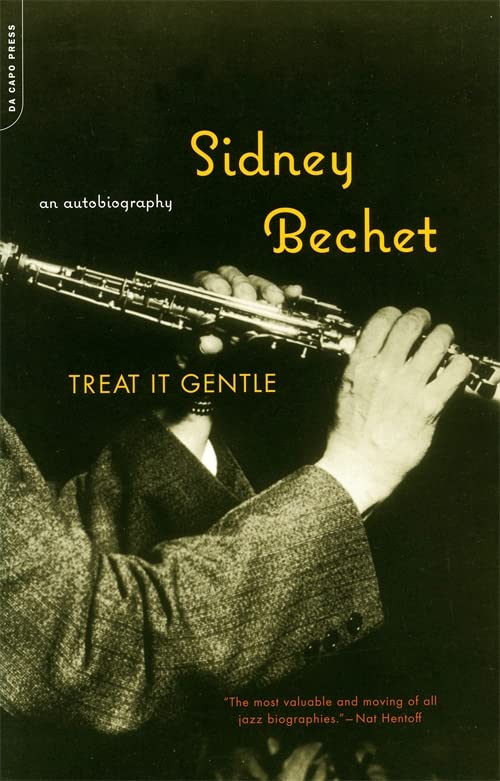Customer Services
Copyright © 2025 Desertcart Holdings Limited


Full description not available
Q**L
Bechet's way or No Way
This is a fascination confession of one of the great jazz musicians of the twentieth-century. I say 'confession' because Bechet was a 'controversial' man. He seemed to want to dominate every musical undertaking, especially the jazz jam in which each person is supposed to be equal to everyone else. Bechet would have none of this. It was his way or no way. This book helps us to understand his deep-seated insecurities and helps to explain why whenever he plays his soprano saxophone or clarinet, his is the loudest and most emphatic solo on the recording. He was a great technician and composed some of the most emotional songs of Nawlins music. It is written in first-person narrative, which keeps the book close to the reader. It is as if you are there when some of the most important moments in early jazz happen.
B**L
Greatest soprano saxophonist ever, his life in full!
Comprehensive biography, from New Orleans beginning to New York to Paris, and many points in between. Honest, and well written.
J**S
The Greatest Jazz Biography
Sicney Bechet was one of the few geniuses jazz has produced. His authobioraphy is the best book anyone has published about the roots, development and meaning of jazz. His accounts of racial struggles, his travels, and most of all. his opinions about music and musicians provide more and more unique insights than any other volume I have ever read. Introduced by Rudi Blesh who has written two excellent books himself, this work is a necessary addition for anyone interested in Black history, American history, jazz history, music, and the experience of a great man in those contexts.
B**.
all that jazz
This biography of Sidney Becket is difficult to follow if you aren't familiar with his recordings. It is presented as a chronological stream of conscious by Becket and I'm sure reflects his perspective of the world. References to other "musicianers" are generally favorable.If this topic is of interest I would recommend the autobiography of Louis Armstrong in his formative years in New Orleans. There is no ghost writer. Armstrong actually learned to type, took his typewriter with him throughout his career and chronicaled his life. His style is very readable and it seems he left nothing out. This book also describes the birthing of what came to be known as Dixieland.
J**N
A Very Interesting Read
One of the great things about this book is the window it provides into the time that Bechet, one of the early jazz masters, came of age.
D**E
Truth in Jazz
Whether you're a musician, especially if you are, read this! Sidney Bechet is not an educated writer, thank goodness, but his spare language is as powerful and moving as his music. He goes straight to the heart of the matter, his own soul, for the truth in jazz which he says belongs to everyone. If you're a "musicianer" or a listener and you improvise, you'll find a brother here. You'll forget whether you're black or white. Or blue, for that matter.
W**N
I like that you keep me apprised of its delivery progress
The product was as advertised and arrived when you said it would. I like that you keep me apprised of its delivery progress. Thank you.
D**G
This History of a Jazzman
This gives us an inside look at a musician who influenced some of our most famous jazz artists. It draws a picture of a very talented and complex man.
M**E
Different
What a different and in depth opening section, in fact Sidney's family history . All that sets you up for what is a 'Real and honest' view and opinion, direct from Sidney of his life,, times , music and friends plus the not so friendly. Far more feeling and philosophy than most others offer . I never knew that he left home with Louis Armstrong, did you?
N**W
Skip the second chapter - "Omar"
Very interesting and insightful glimpse into the life of a great 'musicianer'. Apparently transcribed from Bechets own words and gives great atmospheric (though highly subjective) view of his world from childhood to that of a mature musician with a few scrapes with *the law* along the way.But the second chapter (titled "Omar") I found to be incredibly tedious - it's the story of his grandfather "Omar" a southern Slave who was unjustly accused and killed before Bechets father was even born. Unfortunately Bechet infuses Omars story with in depth feelings of a grandfather that even his own father never met. Don't be put off - skip the rambling 2nd chapter (and maybe the 3rd as well) and there's a great story in there for you...
A**L
Four Stars
good read
M**S
An amazing Read
A must for all jazz enthusiasts. It is difficult to put down once you start reading this book. A wonderful story.
Trustpilot
2 weeks ago
1 month ago